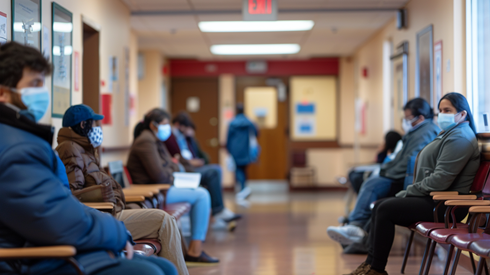Pandemic Risk Moves into Top Spot in AXA 2020 "Future Risks Report"

October 05, 2020

With the world still in the grip of the COVID-19 pandemic, pandemic and infectious diseases have emerged as experts' choice as the number one risk confronting society in the next five to ten years, according to AXA Future Risks Report 2020.
Climate change, which had occupied the survey's top spot since 2015, slipped to second place in this year's version of the report.
Speaking as part of a webinar discussing this year's report, Thomas Buberl, AXA's chief executive officer, said, "The risk of health and pandemic has clearly made it to first place." While pandemics and infectious diseases ranked eighth in last year's AXA Future Risks survey, health is clearly a top concern of every company now, Mr. Buberl said.
Still, the AXA CEO said he believes climate risk's relegation to second place in the survey is a "temporary phenomenon." He suggested that climate risk is the origin of many of the other risks society faces today.
Mr. Buberl said that new solutions will need to be developed to address pandemic risk, and they'll need to involve a combination of private and state actors.
The remaining top 10 risks identified by the survey, in order, included cyber-security risks, geopolitical instability, social discontent and local conflicts, new threats to security, macroeconomic risks, natural resources and biodiversity risks, financial risks, and pollution.
AXA conducted this year's survey with assistance from research specialist Ipsos and in partnership with Eurasia Group to assess the survey's geopolitical themes. This year's report, AXA's 7th consecutive effort, was based on a structured survey of more than 2,700 risk experts from 54 countries, as well as surveys of approximately 20,000 members of the general public.
"I'm certainly not surprised that the survey shows that people are paying more attention to the pandemic as the number one risk right now," Ian Bremmer, president of Eurasia Group and GZERO Media, said during the webinar. What has surprised him is the acceleration of risk trends they've been watching for years, a development he attributed to the impact of the pandemic.
"You're seeing 5 to 10 years of acceleration in a risk profile in 6 to 12 months because of this coronavirus," Mr. Bremmer said.
Mr. Bremmer said that most governments have been able to respond to the COVID-19 pandemic thus far. "But we know that the knock-on economic impact, the social impact, the impact on our political institutions is going to be much more structural than that," he said.
Speaking of risks associated with social fragmentation, Mr. Buberl said such fragmentation will likely be accelerated by climate and pandemic risks. "I do believe our society will be put to a significant challenge going forward when it comes to maintaining social cohesion," he said.
Mr. Buberl said he believes that consequences of the COVID-19 pandemic will be more severe in emerging market countries than in developed markets, because developed markets have greater fiscal resources to smooth the pandemic's impact on society. But, while developed market actors still have sufficient fiscal means to address the pandemic, at some point those countries' fiscal resources could run out, he said.
Renaud Guidée, AXA's group chief risk officer, said during the webinar that in its 2019 report, AXA noted that health risks were "under the radar," even though infectious diseases and pandemics did rank number eight. "Unfortunately, reality has caught up with the situation," he said.
"Having health risks topping the charts shows a reprioritization," Mr. Guidée said. "We focus on what matters.
"This year, we believe that mental health has been overshadowed and deserves a greater focus, especially in the aftermath of COVID-19," he said.
Ulrike Decoene, AXA's group head of communication, brand, and corporate responsibility, said during the webinar that she found climate change's slipping to second place in this year's survey "one of the most interesting findings.
"Obviously, it's understandable given the circumstances that pandemic would take over," Ms. Decoene said. And she noted that there were regional differences in risk rankings. Many European respondents, including those in Germany, Switzerland, Belgium, Italy, and the United Kingdom, still rank climate change the number one risk, she said.
In North America, however, the number of experts who indicated they consider climate change the top emerging risk fell to 46 percent in this year's survey from 71 percent last year. Experts in Asia were also less concerned about climate change than the global average.
The report noted the following: "The countries that downplay the risk of climate change are among those that contribute most to its acceleration and are most likely to feel its effects. There is, therefore, a real danger that in focusing only on COVID-19, the threat that is right in front of us, other long-term challenges are overlooked by the general public and decision makers."
"As insurers, what we see right now—it's not in 5 or 10 years—there's already an impact" from climate change, Ms. Decoene said. Based on the evidence of the growing impact of weather events, flooding, wildfires, and extreme heat waves, "It's here," she said. "It is a clear and present danger."
Mr. Buberl noted the interconnectedness of many of the top-ranked risks. The report notes that cyber risks have grown as a result of COVID-19-related phishing emails, for example, while the risk of geopolitical instability and social discontent and local conflicts have also been heightened in some regions because of the pandemic.
"These used to be very independent risks, but over time they've become far more dependent," said Mr. Buberl. That interconnectedness is something to be considered in finding solutions to the exposures, he said.
October 05, 2020



